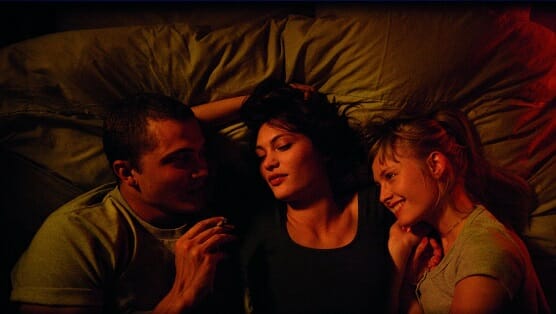
Utterly insufferable as much as he’s provocatively talented, Gaspar Noé doesn’t make movies so much as he throws dares at his audience. Between Irreversible, Enter the Void and now Love, the writer-director-troublemaker has willfully, exuberantly pushed plenty of buttons on his audience, provoking controversy and making his name in the art-house world. Take him as seriously as he takes himself and you’re on the road to ruin. Chuckle at the irascible asshole he is, and you’ll get out alive.
Love is Noé’s two-hour-plus, 3D, pornographic relationship film. The movie is too long, too self-indulgent and too maddeningly precious in its flamboyant attempt to depict the mother of all bad-love scenarios. And yet, if you can get on Love’s mad, ridiculous wavelength, it can be transporting. This movie is a big mess, and also way more fun than it has any right being.
As the film opens, sullen cad Murphy (Karl Glusman) is waking up next to his lover Omi (Klara Kristin) and hearing the sounds of their baby crying. (Well, actually, Love opens with a lengthy, uncut sex scene, which is about par for the course of this unabashedly explicit film.) Murphy despises his life of forced domesticity—they had the kid by accident—and he thinks back to happier times with Electra, his true love who has been missing for months now.
Love is about that relationship, the film playing as a series of flashbacks through his time with Electra (Aomi Muyock). A painter, she fell for Murphy, an aspiring filmmaker, in part because (as we’ll see) they have a pretty fantastic sex life. In Love, erect penises ejaculate, blowjobs and cunnilingus reign, and threesomes are a distinct possibility. On one level, it’s just Noé being Noé, trying to see what fresh outrage he can unveil. But at the same time, this is one of the rare films about love or relationships that puts real stock in the couple’s sexual life. A legitimately sexy film, Love isn’t just titillating but also fascinating, showing how people’s bedroom activities are sometimes easier to negotiate that then their lives upright.
Much has already been made about Love’s, shall we say, enthusiastic amateur actors. Glusman has credits to his name, but this is the first film for the female leads, and occasionally it shows, the characters’ lifelike dialogue sometimes sounding awkward in these performers’ mouths. Because of Love’s explicit content, Noé presumably had a tough time getting more seasoned actors for the parts—and yet, there’s an innocence about his cast that makes the characters’ vulnerabilities more pronounced.
Noé has said that Love is semiautobiographical, which (if that’s true) means he’s more of a pretentious jerk than we suspected. (Murphy’s hipster, film-school demeanor would be a lot easier to embrace if Noé mocked it at all. But, no, we’re supposed to be impressed with the twit.) Even then, though, Love’s endlessly confessional tone can be mesmerizing, a filmmaker marshalling his considerable talents to howl at the moon about the poor romantic choices he’s made. There’s nothing censored in Love, either sexually or emotionally, and as a result the movie pulsates with anxious, lovelorn energy, as if Noé is trying to stay one step ahead of his own blues by making this movie.
Working with his frequent cinematographer Benoît Debie, Noé gives Love a hyperrealistic look, the sex scenes, club sequences and art gallery asides all shot with a feverishness that suggests a man whose painful memories are still fresh. The soundtrack is equally fecund, with everything from Pink Floyd to Funkadelic to Bach being used to underscore crucial moments.
Love is such a hypnotizing, wildly undisciplined movie that it’s somewhat heartbreaking that it grinds to such a halt in the last 20 minutes or so. By that point, we’ve learned everything about how Murphy and Electra fell out and how he ended up with Omi, but the film settles into a masturbatory lament about the impossibility of love that tries even the most forgiving Noé apologist. One expects a Gaspar Noé film to have its indulgences, but Love at the end proves to be too much of too much of a good thing.
Director: Gaspar Noé
Writer: Gaspar Noé
Starring: Karl Glusman, Aomi Muyock, Klara Kristin
Release Date: Screening out of competition at the 2015 Cannes Film Festival
Tim Grierson is chief film critic for Paste and the vice president of the Los Angeles Film Critics Association. You can follow him on Twitter.